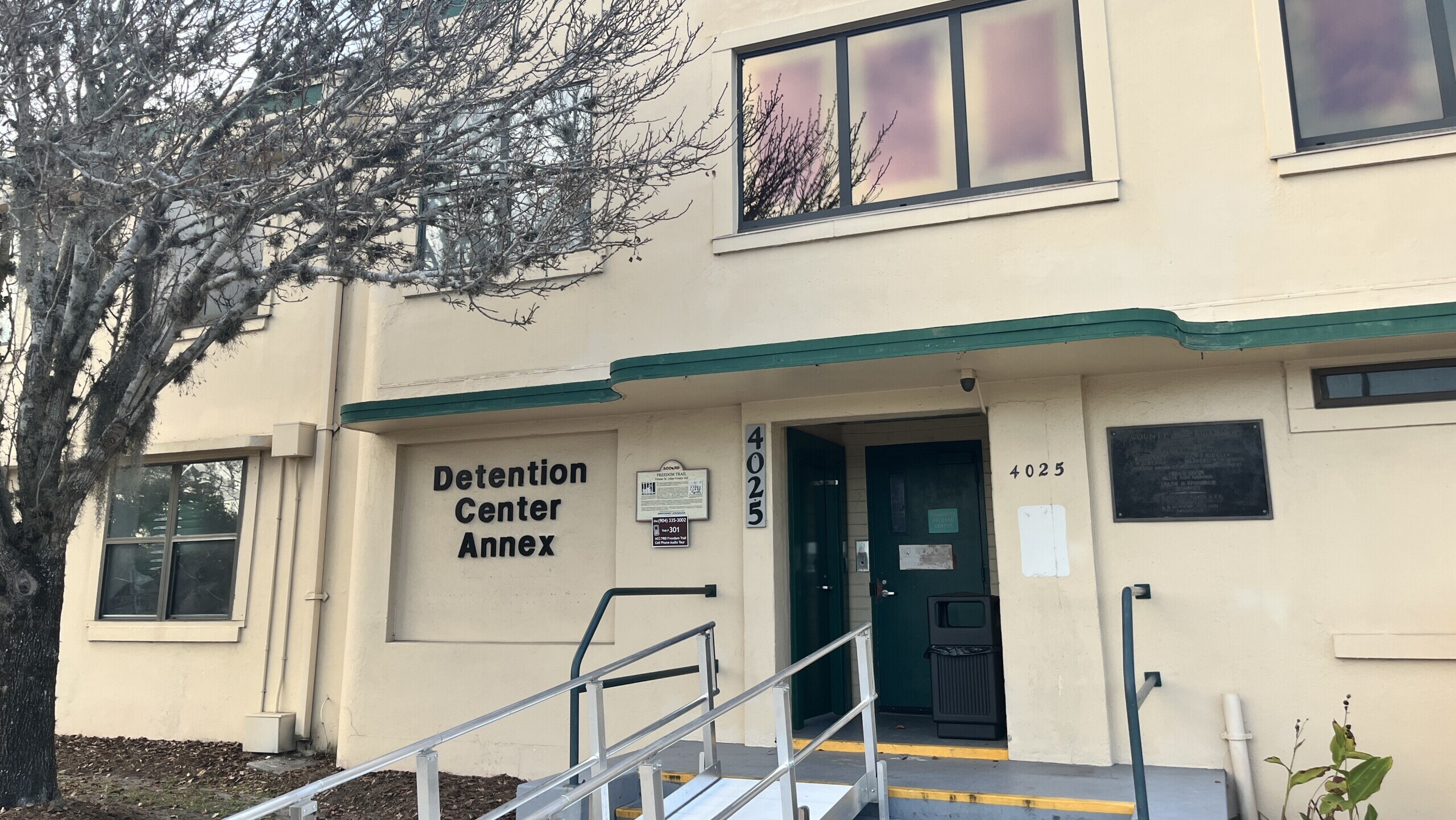Local history advocates are worried that St. Johns County might tear down a building with ties to the Rev. Martin Luther King Jr.
The plan has been delayed for now, but the county’s Cultural Resource Review Board had been set to discuss the demolition of an old county jail building next week.
The building has sat vacant for years, sandwiched between administrative buildings in the St. Johns Sheriff’s Office’s administrative complex on Lewis Speedway. If you didn’t know what you were looking at, you could completely miss the stubby rectangular building built in the 1950s.
What sets it apart from its neighbors are the plaques on it.

In the 1960s, the jail building was where civil rights activists like King and a group of rabbis were held after being arrested for protesting segregation.
Historic preservation advocate David Nolan says he’s happy the county has delayed any decision on demolishing the jail building, but he’s worried the county has not scuttled the idea entirely.
“If our county government won’t save it, in fact wants to make it disappear, then how much confidence can we have in them at a time when they campaign to get the state’s official Museum of Black History here?” Nolan says. “They should show some concern for preserving Black history and not destroying it.”
Nolan works with the ACCORD Freedom Trail, a local organization that has placed plaques at sites around St. Johns County associated with the Civil Rights Movement. Having been involved in historic preservation for decades, Nolan doesn’t believe the county has the best track record.
“I mean, we have a long history here of destroying civil rights landmarks,” he says.
In 1964, the owner of the Monson Motor Lodge was photographed pouring gallons of acid into a pool where a group of young Black people had jumped in to protest segregation. A hotel now stands where the motor lodge once was in downtown St. Augustine.
The old Ponce de Leon Resort Motor Lodge also is gone. That site is where a number of protesters, including the then-governor of Massachusetts’ mother — were arrested for refusing to disband a sit-in the same year.

The request to demolish the building came from the St. Johns County Sheriff’s Office. According to the county, “The reason for the request was maintenance costs, employee health concerns, and the need for site security.”
St. Johns County issued a request for quotes on demolishing the building last November. Before the demolition moved forward, the county’s Cultural Resource Review Board was set to discuss whether the building ought to be preserved for its historic value, and, if it was torn down, how best to protect the nearby buildings.
Local historian Paul Weaver is working with St. Johns County to get all of the information on the building into one place for county officials to review. Weaver is a member of the St. Augustine Historic Architectural Review Board and heads a local company, Historic Property Associates Inc., that works to preserve local buildings.
Weaver acknowledges the building’s relationship to the Civil Rights Movement, but he says the county is doing its due diligence to determine whether the building is historically significant enough to save.
Since the building isn’t on any national database of historic buildings, Weaver says, work had not previously been done to put together a file on its history.
“We’re not trying to deny that history took place or anything,” Weaver says. “Until you put your cards on the table and document it and you apply the criteria, it’s like anything else.”
Opposition mounted quickly when news spread that the building could be demolished.
Nolan wrote to local elected officials, as did Rabbi Merrill Shapiro, the head of the St. Augustine Jewish Historical Society. Shapiro started an online petition to save the jail building that has received more than 100 signatures.
While the jail is not on the agenda for the Feb. 10 meeting of the Cultural Resource Review Board anymore, it has not yet been placed on a future agenda. A statement from the county notes that moving the meeting will give county staff more time to research the building and allow for “further community engagement.”
Advocates like Nolan remain concerned.
“I would feel reassured if they said, ‘Sorry, that was a bad idea. We’ve got egg on our face, we apologize, and we’ll come up with a plan to preserve this landmark and share its significance rather than hiding it,’” he says.
In a statement released Monday night, County Administrator Joy Andrews says she understands how important the building is to the Civil Rights Movement. She commended county staff for “recognizing the importance of this upon receiving the application.”
“We will carefully weigh preservation options alongside the (Sheriff’s Office’s) operational needs,” Andrews says. “We are committed to proceeding thoughtfully, guided by a forthcoming consultant’s analysis, (Cultural Resource Review Board) recommendations, and continued robust community dialogue.”







